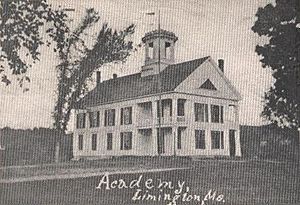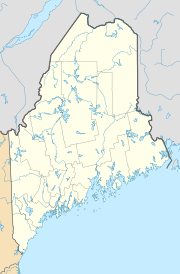Limington, Maine facts for kids
Quick facts for kids
Limington, Maine
|
|
|---|---|

Limington Academy, c. 1904
|
|
| Country | United States |
| State | Maine |
| County | York |
| Incorporated | 1792 |
| Area | |
| • Total | 43.29 sq mi (112.12 km2) |
| • Land | 41.92 sq mi (108.57 km2) |
| • Water | 1.37 sq mi (3.55 km2) |
| Elevation | 381 ft (116 m) |
| Population
(2020)
|
|
| • Total | 3,892 |
| • Density | 93/sq mi (35.8/km2) |
| Time zone | UTC-5 (Eastern (EST)) |
| • Summer (DST) | UTC-4 (EDT) |
| ZIP code |
04049
|
| Area code(s) | 207 |
| FIPS code | 23-39405 |
| GNIS feature ID | 0582558 |
Limington is a small town in York County, Maine, United States. In 2020, about 3,892 people lived there. Limington is known for its old buildings and is a fun place to visit. It is part of the larger Portland area.
Contents
History of Limington
Early Days and Land Deals
Back in 1668, a man named Francis Small traded with the Newichewannock tribe in this area. Their chief, Wesumbe (also called Captain Sunday), was a friend to Small. He even warned Small about a plan to hurt him. Some tribesmen wanted to avoid paying Small for furs. Small managed to escape, but his trading post in what is now Cornish was burned down.
To make up for Small's loss, the chief sold him a large area of land. This land was bordered by the Great and Little Ossipee Rivers, the Saco River, and the New Hampshire border. This big piece of land was called the Ossipee Tract. It included the towns we know today as Limington, Limerick, Cornish, Newfield, Parsonsfield, and Shapleigh.
Becoming a Town
The area was first known as Little Ossipee Plantation. This name came from "Ossapee," its original Abenaki name. The first settler was Deacon Amos Chase. He moved here in 1773 and built a mill by the Little Ossipee River. Other settlers, like Ezra Davis and Jonathan Boothby, arrived in 1774. John McArthur and Joshua Small came in 1775.
On February 9, 1792, Little Ossipee Plantation officially became the town of Limington. It was named after Limington in England. This was the home county of Sir Ferdinando Gorges, who was a very important person in Maine's early history.
Growing and Changing
The land in Limington was rocky, but the soil was good for farming. Farmers grew many successful crops. Another important business was logging. Trees were cut down and used to make lumber, boxes, shingles, and clapboards at mills powered by water. There were also mills for grinding grain and a place for making leather.
Limington Academy was started in 1848, and its building was finished in 1852. The Davis Memorial Library was built in 1912. It was designed by a famous architect from Portland, John Calvin Stevens. Today, 22 buildings in the town center are listed on the National Register of Historic Places. This means they are important historical sites.
Geography of Limington
Land and Water
Limington covers about 43.29 square miles (112.12 square kilometers). Most of this area, about 41.92 square miles (108.57 square kilometers), is land. The rest, about 1.37 square miles (3.55 square kilometers), is water.
The town has two main rivers: the Little Ossipee River and the Saco River. There are also seven ponds in Limington. Four of these—Boyd, Dole, Foss, and Sand ponds—are in South Limington. The other three—Horn, Ward, and Webster ponds—are in North Limington. The highest point in town is Sawyer Mountain, which is about 1,198 feet (365 meters) high.
Nearby Towns
Limington is connected by state routes 11, 25, and 117. It shares borders with several other towns:
- Baldwin to the north
- Standish to the east
- Hollis and Waterboro to the south
- Limerick and Cornish to the west
Limington is located in the very northeastern part of York County. It is about nine miles (14 kilometers) long and five miles (8 kilometers) wide on average.
Population of Limington
The population of Limington has changed over the years:
| Historical population | |||
|---|---|---|---|
| Census | Pop. | %± | |
| 1800 | 1,323 | — | |
| 1810 | 1,774 | 34.1% | |
| 1820 | 2,122 | 19.6% | |
| 1830 | 2,317 | 9.2% | |
| 1840 | 2,210 | −4.6% | |
| 1850 | 2,116 | −4.3% | |
| 1860 | 2,004 | −5.3% | |
| 1870 | 1,630 | −18.7% | |
| 1880 | 1,431 | −12.2% | |
| 1890 | 1,092 | −23.7% | |
| 1900 | 1,001 | −8.3% | |
| 1910 | 980 | −2.1% | |
| 1920 | 803 | −18.1% | |
| 1930 | 747 | −7.0% | |
| 1940 | 864 | 15.7% | |
| 1950 | 851 | −1.5% | |
| 1960 | 839 | −1.4% | |
| 1970 | 1,066 | 27.1% | |
| 1980 | 2,203 | 106.7% | |
| 1990 | 2,796 | 26.9% | |
| 2000 | 3,403 | 21.7% | |
| 2010 | 3,713 | 9.1% | |
| 2020 | 3,892 | 4.8% | |
| U.S. Decennial Census | |||
Recent Population Data
In 2010, there were 3,713 people living in Limington. There were 1,392 households, which are groups of people living together. About 35% of these households had children under 18. The average age of people in Limington was 38.9 years old.
Economy
Brackett's Orchards is a very old family-owned apple orchard in Maine. The Brackett family first settled in Limington in 1783. As soon as they cleared the land, they started planting apple trees. Today, Manley Brackett is the eighth generation of his family to farm this land. They grow apples and many types of pumpkins and squash.
Notable People
- Frank S. Black: He was a US congressman and the 32nd governor of New York.
- Simon Lord: He served as a State Senator in Wisconsin.
- William B. Small: He was also a US congressman.
See also
 In Spanish: Limington (Maine) para niños
In Spanish: Limington (Maine) para niños
 | Audre Lorde |
 | John Berry Meachum |
 | Ferdinand Lee Barnett |


